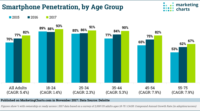Most statements about behavior of Millennials are true for all people when they were 25 years old, regardless of whether they really belong to the generation called Millennials (defined as born between 1995-2005) or some other generation like Gen X, Boomers or Gen Z.
Let’s take one oft-quoted behavior: Millennials prefer renting to owning houses.
When they’re 25, most people haven’t accumulated enough money to buy a house. Therefore they rent. This is true for 25 year-old people of all generations, not just Millennials.
In short, many people – and that includes product managers and marketing professionals – conflate age with generation.
Let’s take a few more behavior traits.
Mobile Phone Usage

According to the common narrative, Millennials like doing everything on mobile phones compared to Boomers and Gen Xers (herewith “Non-Millennials”).
By itself, this statement is correct but it doesn’t provide a basis of comparison across generations since there were no mobile phones when Non-Millennials were 25 years old.
Besides, there’s overwhelming evidence that, like Non-Millennials, even Millennials prefer face-to-face interactions, rather than mobile phone communications, for certain activities like buying a new financial product. More at Will Millennials Bankrupt Neobanks?.
4 years ago, you said something that was a bit counterintuitive. But you're proven totally right now. https://t.co/J5t1ke5Ofc .
"(Research) … reveals a surprising demand for in-person support (from younger consumers)."
— GTM360 (@GTM360) April 23, 2020
Propensity To Borrow
There’s a widespread belief that Millennials take loans for clothes and vacations but Non-Millennials borrowed money only for big-ticket purchases like cars and homes.
ET Magazine amplifies this contrast by using the example of a father-son duo in its article entitled Borrowed joy: Decoding the digital credit boom of India:
SK Basu, 67, and Santanu Basu, his 33-year-old son, live under the same roof. But they inhabit different worlds. The senior Basu, a Kolkata-based retired BSNL executive, has lived frugally, pinching pennies all his life to build two houses and educate his son. To him, a holiday means a short break in Puri, Odisha, on a shoe-string budget. The only loan he ever took was to build a house in 2002. He doesn’t own a car and gets around on a bicycle or public transport. The junior Basu is cut from a different cloth. Founder of a gaming startup with 16 staffers and the backing of investors, he is an ace virtual gamer who leads an unapologetic “work hard, party harder” lifestyle. He has travelled to 50-odd countries and has four credit cards. Gaming consoles, gifts for his girlfriend and overseas holidays are big-ticket expenses. He draws Rs 45,000 salary from his startup, with periodic bonuses from game wins. His monthly credit card payments often add up to Rs 1 lakh. So, he revolves his credit. “On one I pay the entire outstanding. On others, I pay enough to avoid default,” he says.
This observation is really not true.

VGP Group of Companies was a consumer goods retailer in South India in the 1950s. The company pioneered installment purchase of alarm clocks, watches, wall clocks and Murphy transistors in South India in the 1950s. Thousands of people in my parents and grand parents generation bought these products on loan from VGP at the time.
So, even Non-Millennials took loans for buying small ticket items.
As an aside, gypsies was a key customer segment of VGP. According to legend, VGP faced negligible delinquencies even from this nomadic cohort. That was over 60 years ago.
Interestingly, we’re seeing exactly the same behavior today. According to Harshala Chandorkar, COO, TransUnion CIBIL, quoted in the above Economic Times article, “Despite the big growth (in credit), delinquency has barely increased”.
I began this post by saying “Most statements about behavior of Millennials are true for all people when they were 25 years old”.
Most does not mean all. Indeed there are a few behavior traits that are specific to Millennials and were not found in earlier generations when they were 25 years old.
Let’s consider a couple of them.
Newspaper Habit
According to personal experience and anecdotal evidence, Millennials don’t read newspapers.
Unlike the previous behavior traits reviewed in this post, there’s a clear basis of comparison across generations in this instance.
Newspapers were around when Non-Millennials were 25 years old. Newspapers are still around when Millennials are 25 years old.
Non-Millennials read newspapers when they were 25 years old. (Most of them still do). Millennials don’t read newspapers when they’re 25 years old now.
This behavior trait is true and is generation-specific i.e. it’s not valid for other generations at the same age.
(As I write this, I realize that this trait has dependency with geography as well. I don’t recall seeing too many people of any generation reading newspapers when I was in Germany and UK.)
Wealth
Thanks to the burden of excessive student loans, Millennials are seen as less wealthy compared to previous generations.
According to various studies, Millennials own 3% of national wealth whereas Boomers held 21% when they were the same age.
Rare dumb take from Adam… Millennials own 3% of national wealth. Boomers held 21% when they were the same age. I am an ardent supporter of Capitalism but I am not surprised my generation is turning socialist. Govt subsidies of housing and tuition have caused price inflation pic.twitter.com/u8WycxIRuq
— The Devil of YEE (@YeeThaaa) May 28, 2020
This behavior trait is true and is generation-specific i.e. it’s not valid for other generations at the same age.
As the above examples show, some behavior traits are generation-specific whereas others are applicable to all generations at the same age.
It’s important for product managers and marketing professionals to get this distinction right because it could make all the difference between building blockbuster products / services that resonate with the zeitgeist and total duds.
